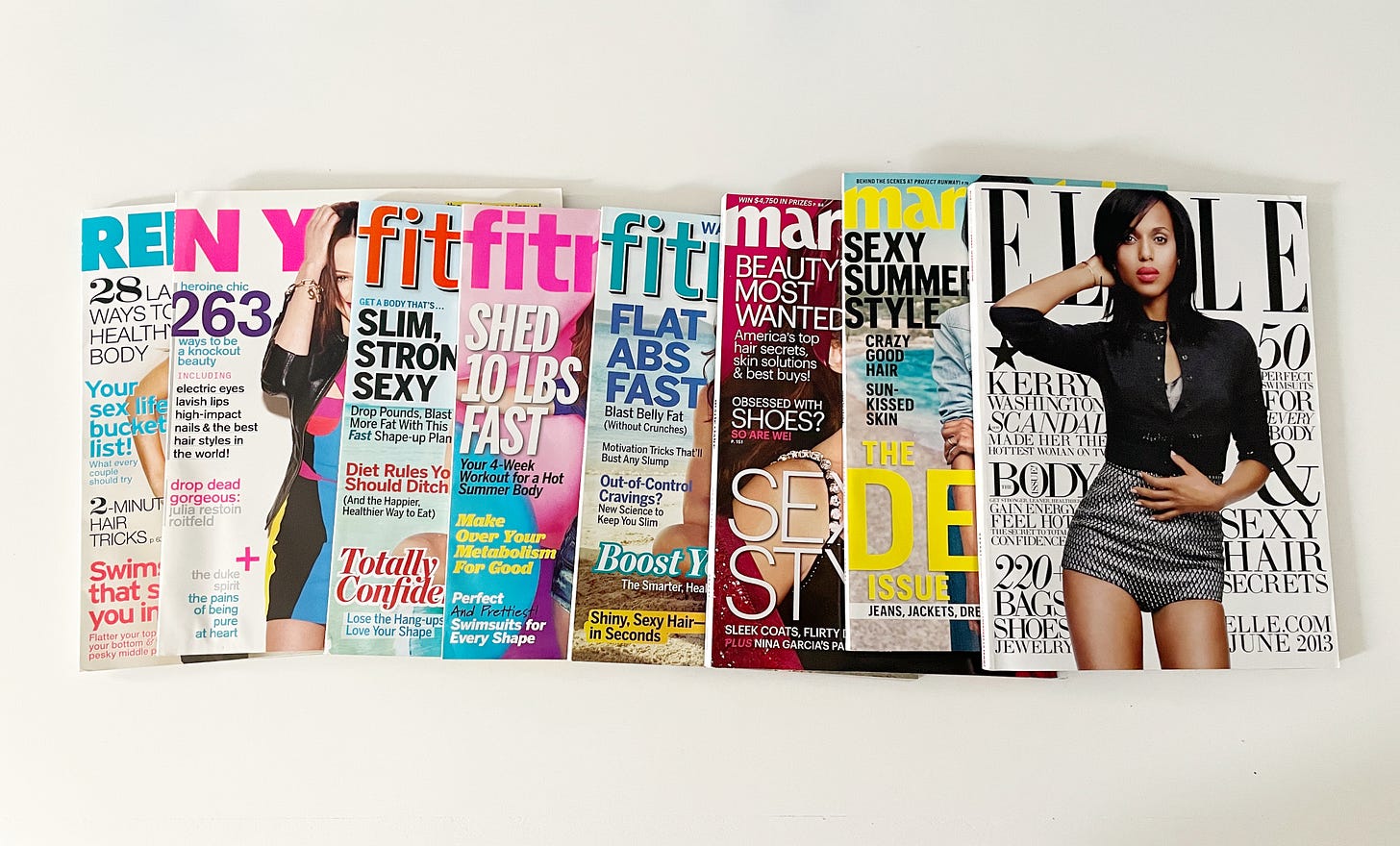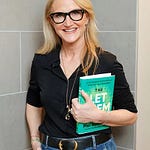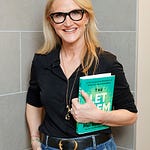We need our own place to critique diet culture and combat fatphobia, without the continual compromise required by corporate media. And, we need this podcast. Because you will never need to worry that the host is going to pause mid-episode and tell you how much I love Noom.
Welcome to Burnt Toast! This is the podcast where we explore questions (and some answers) about fatphobia, diet culture, parenting, and health. I’m Virginia Sole-Smith. I’m a journalist who covers weight stigma and diet culture. I’m the author of The Eating Instinct, the forthcoming Fat Kid Phobia and the newsletter Burnt Toast.
This is technically Episode 24 of the Burnt Toast podcast, but also for a lot of you it’s going to be Episode 1. So we’ll start with some backstory on how I went from a writer of women’s magazine diet stories to a diet culture dismantler and why having a space to do independent, anti-diet journalism is so important, right now.
I’ll also be answering your questions: How to help a 3-year-old who won’t stop grazing? How can we respond thoughtfully to casual fatphobia? What should I do if I’m a houseguest and my host is on a diet? And can my kid really eat ice cream every day?
If you enjoy this episode please subscribe and rate and review Burnt Toast in your podcast player. And sign up for the Burnt Toast newsletter, to get episode transcripts, reported essays and more.
[Editor’s Note: Regular newsletter readers will recognize the first half of this episode from this essay. Feel free to scroll down to the next line break to get to your questions!]
So, I thought today we would start with some backstory.
Eighteen years ago I graduated from college and started my first job the very next day as an editorial assistant at Seventeen Magazine. I was living in a shoebox studio apartment next to the Queens Midtown Tunnel. I walked to work in my Reef flip flops because I couldn’t actually stand up for more than ten minutes in the shoes we wore around the office. I made $27,000 a year.
But for those first few months, I was in heaven at Seventeen. My bosses were these smart, feminist editors who thought that the intelligence of teenage girls was undervalued. We did features on things like hookup culture and youth marketing. And yes, I realized that last one now sounds a little ironic. One of my tasks as an assistant at the magazine was to track down statistics or expert quotes when the editors were working on a feature and realized that it needed some things like that, that the writers had failed to deliver. Seventeen is where I started to learn how to report.
I was learning to report in a way that would pass muster with our research chief who was this completely terrifying person who would throw your reporting file out of her office if you tried to use a non-primary source or a newspaper, or couldn’t backup a controversial fact to her liking.
Yes, this is the same Seventeen that published “I got my period in front of my crush,” the horror stories you remember from Trauma-Rama. And yes, this is the same Seventeen that first published Sylvia Plath.
I learned really quickly that being a feminist in women’s media, but also all mainstream media, meant that you had to hold these strands together as lightly as you could. It meant successfully pitching a story on birth control, only to have your editor write in the margins, “But wait, isn’t Plan B the same thing as having an abortion?” No, it is not.
And it meant every day reading letters from girls who hated their thighs, girls who tried to cut the fat off their stomachs, girls who skipped breakfast and made themselves throw up after lunch, girls who were trying to shrink their bodies in every conceivable way. And then going into a meeting where we would brainstorm five new ways to put the phrase “bikini body” on the cover.
I didn’t last long at Seventeen. A few months after I was hired, a new editor came in with a new team and a new vision. Suddenly there was a lot less meticulous reporting about teenage health and a lot more of that “Bikini Body” stuff, glossed over, of course, with the kind of “Girl Power” talk that wooed so many of us into thinking weight loss could be a valuable self improvement project. So, I moved on. First to another junior editor job at another women’s magazine, and then, when that publication folded, to being a full-time freelance writer. That move freed me up to move out of the city, to wear shoes I could walk in, and to write stories I really cared about.
But: I ran into the same tension everywhere I went, especially when I wrote about weight and health. So I spent most of the next decade still deep inside the diet culture beat, at first rationalizing it with the usual, “Well, this one’s not a diet, this one’s a lifestyle plan.” That same song and dance we talk about all the time. And then slowly, but determinedly trying to crack it apart. And that was uphill work. I found myself translating the principles of Health at Every Size into language that a women’s magazine could handle.
And yet I was continuing to use terms like “ob#se” without any awareness of their toxic history. I made compromises. I added health warnings to stories so the editors would run them because I figured it was better to get a few seeds planted where I could, rather than see the story killed. And also, I had to get paid.
For a while, I even backed away from critiquing the diet industry directly. Wellness culture was shifting things so fast, I wasn’t even always sure who I was mad at. Instead, I started to focus on the beauty industry. In a weird way, it was easier to report on how I learned to do Brazilian waxing so I could interrogate our obsession with it, or to expose the exploitation of nail salon workers than it was to reckon with my desire to diet and detox. But in other ways, it was harder. I couldn’t run either of those stories in women’s magazines where hair removal is gospel and nail polish brands pay the bills. It was and is a tough sell to persuade “real” media outlets (emphasis on the quotes around “real,”) to care about stories in which no men would appear.
Then, a little over eight years ago, I had my first daughter Violet. And as many of you know, she stopped eating when she was just one month old. She needed me to make food feel safe again. That’s the experience that started to connect the dots for me that led to my first book, The Eating Instinct, and that pushed me all the way out of diet culture. I started to explore how we relate to food, and then realized how much fatphobia underpins everything we think we know about food. And health: I wrote about how weight stigma shows up in fertility treatment, in eating disorder treatment, and in science, full stop. Fatphobia is pervasive in parenting culture too, whether it’s as overt as a diet app for kids or more implicit in our anxiety about kids and sugar.
In the past five years, telling these stories has gotten so much easier. We are now in a cultural moment where terms like “body positivity” and “intuitive eating” are embraced by popular culture; where magazines like Good Housekeeping and InStyle ask me to write about pushing back against the pressure to lose your pandemic weight gain, and nobody tries to water down the rhetoric at all. Could these brands be doing a better job owning their own historical complicity in diet culture? Yes, absolutely. But they recognize the importance of the conversation now. I cannot underscore to you enough how much that was not the case, even as recently as when I sold The Eating Instinct.
Still, any time I write for a major media outlet--and again, that has been the primary way I’ve made a living for almost two decades--I am aware that my story, my project is like this little boat tacking its way through a great, churning ocean of other priorities. It gets stuck in a holding pattern if the hook isn’t newsy enough, it gets chopped in half because the word count is too tight, it gets cut altogether because a new editor comes in with a different vision. Or it runs, but I’m asked to add caveats and softeners that make everyone more comfortable while making the story less accurate. Or it runs, and then the next week, the same outlet runs a pro-weight-loss story. And I hear from confused readers who feel betrayed by the switch in tone.
I still see the value in publishing traditional journalism. I adore working with smart editors who tear my words apart and find something so much better buried beneath them. I love writing for outlets with copy editors and fact checkers and art departments, who are all so brilliant at their essential jobs. And I adore seeing how a story resonates across a broader platform, even when that means the comment section goes bananas or all of the angry men in America send me emails. We can’t only preach to the choir.
I started Burnt Toast because I realized that after almost twenty years of doing it their way, we need our own place to critique diet culture and combat fatphobia. Without the continual compromise required by corporate media. Where I don’t have to worry that a sidebar for flat tummy tea will run alongside my explanation of why the “obesity epidemic” was overhyped. We need a place where we can publish stories that I can’t tell in other outlets because they are too niche or aren’t newsy enough but still matter deeply to people’s lives.
We need this podcast because you will never need to worry that the host is going to pause mid-episode and tell you how much I love Noom. I absolutely do not love Noom. So, most weeks Burnt Toast will be a conversation between me and a guest. So far we’ve had really amazing fat activists like Aubrey Gordon and Marquisele Mercedes on. We’ve had authors like Crystal Maldonado, Alyson Gerber, and Tyler Feder, and a bunch of other folks who I would call thought leaders on fashion, culture, health, and parenting. Once a month, I’ll also release a solo episode, like this one, for paid subscribers, where I’ll answer your questions directly. So now, let’s get into those!
Q: My three year old is recovering from a minor illness which came on the heels of a long vacation. So we’ve been out of our usual routine for a few weeks and eating, which had been mostly non-stressful, has become a hot mess. Through traveling and then trying to nourish a feverish child, we were in survival mode, and our snack game was strong. Now, my kid demands only snack foods, is obsessing over sweets, and wants to graze all day. I want to get back on our meal/snack routine for both our sakes. I cannot dispense food all day long and my high energy kid needs the structure of sitting down to eat in order to focus and notice hunger and fullness. But it seems like there must be a feeling of restriction around snacks and sweets and I’m worried about exacerbating that.
So, normally when we talk about this issue, you guys hear me say over and over again that if your child is fixating on a particular food, it’s probably because they think they don’t have enough access to it and the answer is to lean in and give them more freedom. But I do think there’s a slight exception for that in the situation that this mom is outlining, where you’ve been traveling or you’ve been sick, so you haven’t been on your normal schedule. When we go through seasons like that, it’s very normal for everything that kids understand about food to go out the window. I don’t think that your child is feeling restricted about snacks and sweets, I think they’re just feeling generally uncertain because of the lack of structure. When we feel uncertain, we can fixate more on our comfort foods, right? Because food is feeling a little unpredictable. In a way, your child asking for that favorite food all the time is their way of saying, “I need more routine, I need more predictability, please.”
So, what I would do is not mess with the particular foods your kid wants. I would work on getting back on the schedule first, even if it means your child is eating Oreos at every meal and snack for a few more days. Serve the favorite snack foods, but just work on breaking the grazing pattern and getting to eating at a more regular schedule. Sometimes what is happening with grazing is kids are feeling like they need to be in charge of making food happen. Which is not to say you haven’t been feeding your child, you obviously have been. And I know when you’re in that snack mode, you’re like, all I do is give you food. But they somehow feel like it’s their responsibility to make sure they get enough because there’s no schedule and it’s not predictable.
So, if we work on making it predictable, but you serve the foods that they’re most anxious about having access to, you can ease the scarcity mindset. You can give them that comfort of structure.
Once it feels like you’re back in a routine around eating, then I would start to bring in other foods, have more variety, maybe start to say things like, “Oh my gosh, I love Oreos so much, too. We’re going to have them for a morning snack, but not for breakfast.” (I’m always using Oreos, as the example, but whatever your child’s comfort food is, of course, insert here.) Work on structure, then you can work on food variety. Don’t try to tackle it all at once. That will be too big of a change. And good luck.
Q: How can we respond to casual fatphobia and weight stigma?
This is the challenge with holiday gatherings, right? Because this is when people make those side comments like, “Oh, I need my stretchy pants for this meal” or, “diet starts Monday!” Even if it’s not directed at you, it can feel really awkward to tackle it because you look like the buzzkill. You’re the one who’s suddenly taking it really seriously and oh, we were all just joking. But I think we do need to start to build our muscles for how we push back in these moments.
Someone I follow on Instagram, who posts a lot of memes, recently posted a meme that was super fatphobic. [TW: I’m going to describe it.] It was one of those dogs that has very thin legs and very round bellies, and for some reason, this photo of the dog was standing on two legs and wearing jeans. The caption was something like “how men over thirty look in jeans.” I am sure she posted it thinking, “I’m laughing at men and we are allowed to laugh at men.” Which, you know, is sort of true. I think that was her intention on one level. But it’s not okay to make fun of the bodies of fat men or fat women or fat people of any gender. It’s not okay to equate fat people with animals. And the meme did both those things. So I sent her a message and said, “I know your intention was to be humorous, but this meme equates fat people’s bodies to animals. That is very harmful.”
She was immediately defensive. She said, “You know my account is a humor account, try to take it in that spirit. I’m really sensitive about body image issues. That’s not what I was doing here. I’m just making fun of men over thirty!”
Of course, it’s also not okay to be posting ageist memes, so that wasn’t a super helpful argument. But I didn’t get into a long explanation of why the meme was wrong. Instead I said, “I am saying, as someone in a bigger body than you, with a body that looks quite similar to this animal, that I find this harmful. And I’m also saying this to you as someone with a fair amount of privilege as a small fat person. There are people in bigger bodies who will find this meme even more harmful, who won’t feel safe speaking up. And so I hope you’ll reconsider this in the future.”
I stayed really polite, I didn’t get super inflammatory. I felt annoyed, to be honest, that I had to be that thoughtful and careful about it because this is part of the labor of engaging on these issues, right? Someone else has said the offensive thing but somehow it’s our job to keep it light and friendly, as we are calling them out on their offensiveness. I want to hold space for that piece of it. But I also think the reality is, you’re not going to get anywhere with someone if you come in and say, “This is horrible. How dare you post it?” They’re only going to get defensive, and they’re not going to start to think about it.
She did come back to me after that follow-up and said, “I appreciate you for speaking up on this.” And I haven’t seen a fatphobic meme go up on her account again. So I’m hopeful that there was maybe an opportunity for some learning there.
Figuring out some ways where you can, in a friendly way—and again, holding space for the fact that it’s annoying that we have to be so friendly about this—say, “Oh, hey, I’m not really here for fat jokes,” or, you know, “Let’s not go after their bodies.”
I think about this a lot. When people make jokes about Donald Trump, there is so much material about Donald Trump, you can make a million jokes about him, you don’t have to talk about the fact that he’s a fat person. We don’t need to go there. There are many other reasons to hate on him. If someone comes back to you, though, it’s useful to say, “Look, these comments do cause harm. And, you know, I’ve been thinking about this more. I’ve been trying to do my own work.” I think it’s useful to own, “I don’t always get this right myself.” Then it’s not you versus them. You’re saying that this is learning we all need to be doing and this is learning I’m doing right along with you.
Q: I have a really odd food etiquette question about being a guest of someone who is massively restricting calories and we do not. I felt guilty eating the entire week at her house and was really hungry, and we are back there over Christmas. She has a very good friend from high school and not anorexic, but suddenly super aware of every calorie and kept bugging me if I ate. Any polite way to handle this?
This is another one I think a lot of us may be encountering over the holidays. Some of the people hosting us may be on diets, and that’s going to be a drag. I think it’s important, as a guest in someone’s home, to stay aware of the amount of work they’re doing to host you with these meals. There is a lot of labor being performed by your friend and by women in general around the holidays. Even if that labor comes with an infusion of diet culture, we want to be respectful of the labor and make it clear that we see the labor.
To that end, I think one easy solution might be to say, “You know, you did so much to host us last time, we are so grateful. This time, when we come to stay, please let us buy the groceries!” And go and buy groceries and take her list and buy whatever she needs for cooking Christmas dinner, but also buy food you want to have in the house. Buy the food that you like to have for breakfast, or some snacks you want to have on hand.
To be honest, this may still be super stressful to her because people who are restricting are often very anxious about having more food in the house. But I think if you keep framing it as, “we want to take all this work of hosting off your shoulders, you don’t need to feed us every meal,” that makes it easier for her. And at least you’re acknowledging her labor even while you’re also meeting your own needs.
If buying all the groceries isn’t an option, pitch in to help with the cooking as much as you can. If you’re staying for more than just Christmas Day, say, “Okay, you’re cooking Christmas dinner, but can we please handle breakfast that day? Or can we please make lunch the next day?” So you’re acknowledging her labor, you’re helping to reduce her labor, and then at the same time, you’re making sure there are a few meals in there that are going to have enough food and food that you like to eat, as well.
If grocery shopping and cooking isn’t an option, I would offer to pick up takeout. Suggest eating out in restaurants for other meals. Go out and get bagels in the morning for breakfast. Look for other ways to bring in more food, not in a way that’s rejecting the food that she is making, but in a way that is supplementing. And then that way, when you are placing restaurant orders, you can order what you want and it’s really not her problem.
If none of that feels like an option, or it helps but doesn’t help that much, you can also pack some snacks to keep in your room or wherever you’re staying. So if she makes a very sad diet-y dinner, you can at least go have some chips or some granola bars afterwards and not be starving. That’s awkward and it doesn’t feel great, but if you do that, do not feel ashamed about the eating you’re doing that as a way of managing your own self care during the holidays. Holidays are stressful for a million different reasons. You not having enough to eat is not going to make it better.
As for her comments bugging you about what you eat, I think that’s another thing where setting a really friendly boundary, maybe over email before you get there or the first time the comment comes up, could be helpful. You can say something like, “Our bodies are all different. We just need different amounts of food.” Just make it clear that you’re not going to get into a nickel and dime-ing conversation about she’s eating this way or you’re eating that way. Sometimes people start to have this diet talk war, where they’re comparing health strategies, and that’s not at all helpful. So make it clear, you’re not here for that. However you eat, you’re not going to defend it to her. And you’d really rather talk about other things, it’s more interesting.
It sounds like she’s deep in her own struggle here. So anything she does say about your eating is a reflection of her own anxiety, it is not actually about you, even though it’s going to feel like it’s about you. Just remember, if you want to take seconds at a meal, if you want to order something different, if you suggest going over to another friend’s house, because that way you’ll get a meal you like, you don’t owe her an explanation for that. You can just say, “Oh, this is so delicious. I’m excited to eat it. So and so’s a great cook,” and leave it at that.
Okay, and now we are going to wrap up with a segment that I think is going to be a regular feature on solo episodes, called, “Can my kid eat that?” And the answer is always going to be yes!
I get a version of this question every single week, so I’m going to keep answering it every time we do these episodes because I get it. I get this anxiety and I think it’s really important that we keep speaking to it. So this week’s can my kid eat that is:
Q: I have a question that I am truly confused about. How many days a week can my newly two year old toddler have an ice cream cone as a snack or dessert? He is obsessed. He created his own sign language for it. He brings books open to the page with a picture of an ice cream. Not that it matters, but he’s under 5% for height and weight. So I usually give him whatever he wants. I just have all of the voices in my head on this.
First: It doesn’t matter that he’s under 5% for height or weight. Yes, your child can have ice cream every day for a snack or dessert. If your child is in the zero percentile if your child is in the 99th percentile. The food we serve our children is not dependent on their body size, ever.
How many days a week can your two year old have ice cream? Seven. There are seven days in a week, your child can have ice cream seven days a week. There is no law against this. Yes, you can serve ice cream every day. I say this as someone who did serve my two year old ice cream every day. My younger daughter was two in the summer of 2020 When we were in lockdown, and I was stuck at home with two children and zero childcare and nowhere to go and nothing to do. We had “ice cream o’clock” every afternoon on our front porch. The reason we did this was because as the weather started warming up, my kids were both asking for ice cream pretty often and fixated on when we would have ice cream again. I realized they had a scarcity mindset about it just because when it’s cold, we don’t eat ice cream. So then when it’s warm, and we start eating ice cream again, it’s super exciting, and they want to have it all the time. So we made ice cream o’clock a daily thing and we ate it every single day. After about three weeks, they were completely over it, they would leave it to melt in puddles while they went off to play. It was not a concern. We kind of switched it to popsicles, sometimes ice cream sandwiches, sometimes they didn’t want ice cream and they had a different snack. And the issue completely faded. And that was true for the two year old and for the then-six year old. So them being a younger toddler doesn’t impact this they will be able to adjust and habituate to having access to the food just as well as an older kid.
I would make it a specific ritual like that though, because you can tell him this is the time we will have ice cream. And you don’t have to have ice cream for breakfast, lunch, and dinner and every snack. You can say “Oh, I know you love ice cream so much” when he makes his little sign (by the way, that’s adorable.) When he makes his ice cream sign or shows you the book with ice cream, say “Yes, I can’t wait! We’re going to have ice cream after your nap.” Tie it to something he can really understand because at two he doesn’t grasp the schedule well and that’s why he’s asking so often, as well. So, hearing we’ll have it tomorrow or we’ll have it this weekend is probably too vague and too far off for him.
Thanks so much for listening to Burnt Toast!
Once again, if you’d like to support the show, please subscribe for free in your podcast player and tell a friend about this episode.
And consider a paid subscription to the Burnt Toast newsletter. It’s just $5 per month or $50 for the year. You get a ton of cool perks and you keep this space ad and sponsor free.
The Burnt Toast Podcast is produced and hosted by me, Virginia Sole-Smith. You can follow me on Instagram or Twitter.
Burnt Toast transcripts and essays are edited and formatted by Corinne Fay, who runs @SellTradePlus, an Instagram account where you can buy and sell plus size clothing.
The Burnt Toast logo is by Deanna Lowe.
Our theme music is by Jeff Bailey and Chris Maxwell.
Tommy Harron is our audio engineer.
Thanks for listening and for supporting independent anti diet journalism. I’ll talk to you soon.

















Share this post